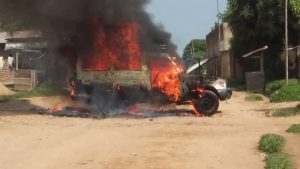
Deadliest Outbreak to Date
We are in the 11th month of Congo’s longest and deadliest Ebola outbreak in history and by all predictions will be here for at least another year. What has characterized this particular outbreak and distinguished it from others is its locale in the midst of a war zone with impeded access to affected areas. In addition, there is widespread resistance to comply with efforts to reduce the spread of Ebola such as vaccination of those exposed, quarantine of those with symptoms, and safe burial of persons who succumb to the virus.
Many are Dying at Home The reasons are complex: some deny the disease exists, others wonder why there is a disproportionate amount of international attention to Ebola citing other pressing concerns such as rampant insecurity, lack of food and water, and the prevalence of diseases like malaria which claims over 300 lives of children in this country each day. Some say the only reason foreign-aid workers are here is to ensure that Ebola does not cross borders into their own countries; the more cynical claim the government intentionally brought the Ebola virus to this isolated part of Congo to decimate the local population (which has been under attack from rebel militias for over a decade). Handwritten notices around town warn people not to receive the vaccine as it will infect them with Ebola or to avoid going to Ebola isolation and treatment centers at all costs as they will never come out alive. As a result, more than half who die in this outbreak do so hidden away in their homes or shelters refusing proven interventions such as vaccination and new drugs which, if given in time, can significantly decrease transmission and mortality. Those who remain in their homes tragically expose other family members who in turn contract the disease and die.
Violent Trends
Beyond this climate of widespread resistance to the Ebola effort is a current trend towards violence with the allegation that “if we force the Ebola workers out, we will force the virus out as well”. Since the start of the outbreak in August 2018, authorities have documented over 15,000 violent attacks on health care facilities and health care workers. Hundreds of clinics have been attacked, looted and burned to the ground by civilians conveying their anger and fear onto any infrastructural reminder of the Ebola outbreak (clinics, ambulances and treatment centers).
Targeting Ebola Workers
Far worse are the growing indiscriminate attacks on Ebola workers: community mobilizers, vaccination and burial teams, nurses and doctors. Two of the many community health workers we support were killed while working in the outbreak area; one for trying to protect a neighborhood health clinic from being looted and another when she continued to speak out and raise awareness of the danger of Ebola despite threats to keep quiet. I was at a rural health clinic in April as part of our work to educate and prepare health care workers and facilities for Ebola cases when we heard sustained gunfire from a regional hospital down the road. Within 10 minutes of my arrival at the hospital, a colleague and well-respected Cameroonian doctor from W.H.O. died from gunshot wounds sustained during the attack by a militia group targeting those affiliated with the Ebola response.
Just last week an ambulance sent to a nearby home to pick up an Ebola victim was stopped by a group of youth and set ablaze. Two of the four attendants caught by the mob were severely beaten and are in local hospital in a coma.

Burning ambulance (Butembo DRC June 2019)
Militarized Response? There are many reasons for the widespread resistance and outright violence. None justify the vehement actions described above, but we need to understand the ‘why’ in order to proceed with the ‘how’. Some believe that a militarization of the Ebola Response (armed escorts) is now necessary to carry on this critical work, but I fear that associating relief workers with armed escorts will only exacerbate the tension between health care workers and the population, and underscore the prevailing belief that our interests lie only in containing the spread … and not saving lives.
Dialog, Trust, & Prayer We deeply care about those caught in the middle of this deadly outbreak: the innocent children and women (disproportionate victims of Ebola) as well as those who are ‘casting rumors and stones’, in frustration and fear, to no avail.
It is, in a word, exasperating to have new methods at one’s disposal (a vaccine and effective treatment) yet see case numbers rising, mortality increasing, and community trust and resilience eroding. The virus continues to spread in villages ever closer to the South Sudan and Uganda borders. It will take more than medicine and might to overcome Ebola in this part of the world … but rather, mutual respect, earnest dialog, fervent trust, and an abundance of prayer!
But the wisdom from above is first pure, then peaceable, gentle, open to reason, full of mercy (James 3:17)